Eroticism and Love in Romeo and Juliet
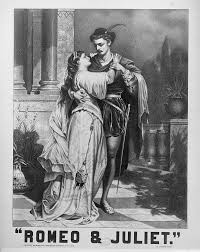
The enduring strength of Shakespeare’s tragedy Romeo and Juliet in part stems from a resonant argument over the nature of love between two of the drama’s most charismatic characters. While nearly everyone is familiar with the tragedy that belongs to the two star crossed lovers of the title, any audience member can also feel in Shakespeare’s tragedy the fire of theoretical warfare just as vivid and engaging as the physical war between the Montagues and Capulets by examining Juliet’s and Mercutio’s opposed notions on eroticism and love. At the end of the play, as we shall see, Romeo’s moral development, and the audience’s appreciation of the mutuality of love as Juliet best expresses it, comes at the cost of warding off Mercutio’s coarse wit. Although Juliet and Mercutio never meet within the course of the play, their visions of love and eroticism are diametrically opposed, and we, as readers, are meant to notice this from the very structure of Shakespeare’s work. Although the mutuality of love Juliet expresses leads to the couple’s demise, it also (indirectly and ironically) is one factor in the demise of Mercutio. Also, Juliet’s death, which is a product of her faith in the mutuality of love, is able to plant the seeds of reconciliation between the warring families. It is only when one casts off the superficial coarseness as expressed in Mercutio that the appreciation for mutual passion can begin to flower. These arguments over love still resonate with modern audiences and make Romeo and Juliet an eternal meditation on the nature of love and eroticism in our lives. Even as we continue to evolve in our own notions of what love and eroticism mean in our relationships, it is worthwhile to meditate over the notions brought to the fore in Romeo and Juliet.
Mercutio, Masculinity, and Queen Mab

As noted by literary critic Mario DiGangi, Mercutio tries to return Romeo to the world of “masculinity” at the start of the play by arguing that women are merely objects of “sexual desire” (DiGangi 4). Mercutio’s vision of love holds great sway over both Romeo and the audience for the first half of the play, and is a vision Romeo will move away from as he moves closer towards Juliet. Indeed, before Romeo leaps over the fence to begin his education in the mutuality of love, as Juliet fully embodies in the balcony scene, Mercutio is shown taunting his friend with some of the crudest sexual puns in the entire play. Mercutio envisions Romeo sitting under a “meldar tree” wishing that one of those apples were the “open arse” of Romeo’s former crush Rosaline, so he could experience erotic satisfaction (II.i.35-38). These obscene images prove both the baseness of Mercutio’s wit and also his devaluation and disbelief in the mutual love that will be expressed through Romeo and Juliet’s relationship. Mercutio embodies an ideology of love where sex is the end game. This is an ideology that Romeo needs to leave behind if he is to mature in Juliet’s vision of the mutuality of love and eroticism. For Mercutio love is non-existent as either a mutual or spiritual endeavor. Love for Mercutio is simply a word used to mask the biological propagation of the species; the darker, yet truer, sexual desires.

The greatest expression of Mercutio’s view is shown once he launches into his Queen Mab speech in Act I scene 4. “Queen Mab” is in itself a course pun referring to a prostitute. Mercutio’s vision expresses is a fantasy constructed through his own imaginative prowess that can only provide fulfillment to manifold human desires in dreams (DiGangi 96). As DiGangi notes in his annotations to Romeo and Juliet, Mercutio’s wildly imaginative speech is given ostensibly to “mock Romeo” for his “romantic dreams,” but it also allows Mercutio to delve into his own equally fantastic “poetic imagination” (DiGangi 96). By the end of the Queen Mab speech, which began with an almost childlike charm describing the wish-fulfillment of various persons and professions, Mercutio describes Queen Mab as not a dream but, as literary critic Harold Bloom notes, a “nightmare, the incubus who impregnates maids” (Bloom 95).
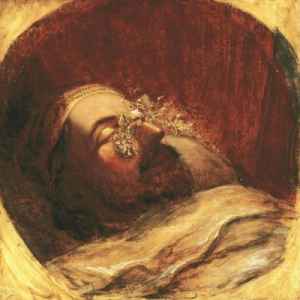
Bloom’s observation is made clear in Mercutio’s image of the “maids” who Queen Mab “presses…and learns them first to bear, / Making them women of good carriage” (1.4. 90-93). Queen Mab is neither the comedic fairy Puck of A Midsummer Night’s Dream nor the androgynous shape-shifting Ariel of The Tempest. Instead, Queen Mab embodies an expression of the ever-expanding imagination of Mercutio’s coarse mind and, as seen in his final image, the very teacher of impregnation to young girls. But the impregnation Queen Mab represents, and the nightmarish quality of Mercutio’s images, expresses a fear latent in Mercutio’s male psyche over the influence he supposes the feminine to hold over his own desires. Queen Mab is a “nightmare” in part for she crosses the line between the imaginary and the real with this image of impregnation. The impregnation of the flesh is not merely a mutual product of man and woman but also between the realm of invisible things (imagination, desires, dreams) with that of the physical body. For Mercutio, unschooled in the virtues of mutuality of love as Juliet teaches us, there is a kind of nightmarish quality to the power Queen Mab holds over man’s will, willing us towards the erotic satisfaction he sees as the real end game of all relationships, while simultaneously leading us on to the inevitable cycle of birth, old age, and death we are all spiraling through endlessly.

Queen Mab’s image mixes, in Mercutio’s mind, prostitution with bearing children. Mercutio’s Queen Mab stands as a testament both to his view of women as mere sexual objects, but also, as the objects of desire, the forces of power over the will of man. Queen Mab then, for all Mercutio’s poetical prowess, expresses his obsession with coarse poetic fantasy which, in the end, can only devolve into the nightmarish image that it does. While his juvenile joking over the natural human process of propagation might be used as a defense mechanism against the entropy of the reproductive cycle we are all inscribed into, it is no match against the power that endless cycle exerts on his own supposed will.

Mercutio does not stop his speech on Queen Mab of his own free will, he actually has to be stopped by Romeo who notes that Mercutio “…talk’st of nothing” (1.4. 93). Romeo is correct in saying that Mercutio’s vision is “nothing” in two senses. Mercutio’s vision is one of poetic fantasy, as insubstantial as air, but also rooted in the physical world where those airy desires are actuated, which is indicated by the double sense of the word “nothing.” “Nothing” was a slang term for “vagina” in Elizabethan England (Bloom 95). Even Mercutio acknowledges his vision of Queen Mab and her actions as being “children of an idle brain,” which continues the image of birthing we have seen throughout the Queen Mab section (1.4.95). The image of birth in Mercutio’s mind, whether in actual reality or in the fantastical visions of the Queen Mab speech, seems to be “[b]egot of nothing but vain fantasy” (1.4.96). This is where the horror of Mercutio’s vision lies; because Mercuito is a mortal and not an actual fairy like Ariel or Puck, his imaginative vision must inevitably fall somewhere in between the realms of dreams and reality. Mercuito has no power as a man, even as a man of poetic predilections, for the products of his idle brain bring forth no physical fruit.
Juliet and the “Religion of Love”
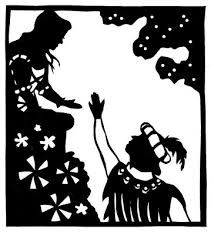
Shakespeare places Mercutio’s most obscene depiction of the baselessness of love directly before the immortal balcony scene to draw a deeper contrast with Juliet’s vision of love. In the balcony scene we get the first taste of a different and more hopeful vision of love and eroticism as Juliet expresses her love as being as “boundless as the sea” because “the more [she] gives to [Romeo]/The more [she has], for both are infinite” (II.ii.133-135). The cycle of human passion and propagation is the same as Mercutio must have envisioned it, but for Juliet the infinitude of love is a wave that does not drown her, but one on which she allows herself to be swept away in, acknowledging her part in the infinite cosmic drama unfolding within and around us.
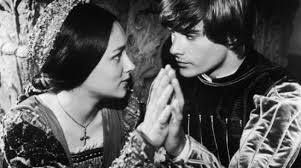
This holy shrine, the gentle fine is this:
My lips, two blushing pilgrims, ready stand
To smooth that rough touch with a tender kiss.” (I. v. 93-96)
In this scene we witness what Harold Bloom calls an “epiphany in the religion of love” (Bloom 91). Juliet, young though she is, has discovered the sweetest love exists through a “mutual authorship,” literally mirrored in her first conversation with Romeo, which takes the form of a perfect sonnet (DiGangi 6). Romeo and Juliet’s sonnet is formed over the topic of a pilgrimage, a “healing journey to a new land” (DiGangi 6). Both of them sin in their first kiss, but both also reciprocate the sin. They have already sealed their mutual affection, but also their mutual downfall. From the start, Romeo and Juliet’s affection for each other is founded on higher ideals than the crudity and nightmarish paralysis of Mercutio’s brain. It is the value of love as a natural, inexplicable, and endless part of the human cycle, a melding of the imagination and the real, that Juliet best expresses and which Romeo begins to appreciate in his mutual authorship of their first sonnet. Even though sexual desire and sexual attraction influences their relationship, it does not pervert it as Mercutio might have us believe. Indeed, sex, as we shall explore below in Juliet’s soliloquy, is actually the perfected expression of the religion of love.
These antithetical attitudes towards love are clear in a broad sense between Mercutio and Juliet, but what makes this play even more enduring is the complexity of Shakespeare’s implications for both mutual and base erotic love. Mercutio’s death is of extreme irony because he dies, at least in part, due to the very thing he disbelieved in: Juliet’s “religion of love.” Had Romeo not been in the paradoxical position of being both kin to Tybalt (through his marriage to Juliet) and to Mercutio he would not have been so aggressive in trying to save Mercutio’s life from Tybalt’s sword, which ironically hastens not only to Mercutio’s death but Romeo’s own demise in his vengeance towards Tybalt. Mercutio dies uttering his famous: “A plague o’ both your houses” (III.i.101). And, of course, that is what the death of Mercutio becomes for Romeo and Juliet, for it precipitates the inevitable demise of the fateful lovers. While Romeo tries to teach the happiness of love he has learned with Juliet, his words fall on deaf ears, and the endless spiral of violence, as eternal yet antithetical to that spiral of love Romeo has entered with Juliet, is only furthered.

After the death of Mercutio, Juliet takes center stage as the spiritual core of the play. Her speech in Act III scene ii directly follows the death of Mercutio and Tybalt, and reveals much of why Juliet is such an enduring character due to her ideology of love. Juliet expresses in this soliloquy the desire for night to come so that she and Romeo may perform their nuptial rites. This is not the nightmarish night of Mercutio’s imagination, rather Juliet’s night is the holiest occasion of her whole life, for in the yielding passion of her budding sexuality she both expresses and receives the greatest benefit of the religion of love. What is noticeable in this speech is Juliet’s own erotic passions when she exclaims to the Heavens: “Hood my unmanned blood in my cheeks,/ With thy black mantle, till strange love grow bold,/ think true love acted simple modesty” (III ii 13-15). Juliet desires that her inexperienced virginity will not show through in her first erotic encounter with Romeo. The very fact that Juliet wants the experience of sex to be one of mutual pleasure gives her speech a passion diametrically opposed to Mercutio’s image of Queen Mab’s impregnation or of the apple’s “open arse.”
Juliet’s erotic passion is real and physical, but it is not crude and base as Mercutio envisions it because it is consistently concerned with mutuality. Juliet’s valuation of love is too high to reduce sex to base animal needs, instead sex becomes the consummation of her original vision on the balcony scene of the infinitude inherent in mutual love and passion. Sex for Juliet is an extension of the pilgrimage image which launched her relationship with Romeo. Perhaps nuptial sex itself has become for Juliet, pilgrim in the religion of mutual love as she is, tantamount to the Medieval pilgrim reaching the cathedral.
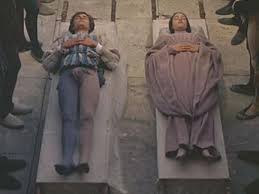
Juliet’s suicide, then, is a further expression of the complex view of love presented in this enduring tragedy. Because Romeo no longer lives, Juliet forfeits her own life, believing that death is better than to live without love. Certainly under Juliet’s circumstances and given her youthful rashness it is all too clear to her that there is no other option for the mutual lovers than to be joined in death. If Juliet were to continue living while seeing Romeo’s body in front of her the audience would have lost all credibility in her vision of a perfect mutual partnership. She proves herself to be a true pilgrim of the religion of love in her suicide, and although it is tragic to witness, it also gives her vision of the sacredness of mutual love even more credibility, strength, and beauty.
Since Romeo is no more, the only logical option for Juliet in order to keep the mutuality of her love alive is to, perhaps paradoxically, end to her existence. Her death is ironically opposed to that of Mercutio who, as we have seen, did not die of his own free will or of his own hand. Mercutio died due in part to Romeo’s intervention, and in part to his taunting. Juliet had the freedom of choice between life and death once Friar Lawrence exited the stage, and she takes the sword upon herself, thus consummating her vision of love in death. So, whereas Mercutio’s death was an absurdity to him due to the unknown marriage between Romeo and Juliet, Juliet’s death is a self-conscious affirmation of the existence of a mutuality in love, even if it must be expressed through death.
Mercutio and Juliet both express two diametrically opposed views of love that still entice and perplex theater goers. While Mercutio’s amazing imaginative and poetic powers shine, he produces a deep, base, and almost nightmarish vision of love. Juliet, on the other hand, through both her innocence and her boldness, forms the plays passionate center as a firm believer in the mutuality of love no matter what the circumstances. Juliet’s strength and maturity continue to stun and affect us for her vision of love has much to offer in affirmation of the human will. Shakespeare always gives readers psychologically real and rich human beings to consider in his masterpieces; Mercuito and Juliet’s notions of love and eroticism captivate us more intensely than other works because of their depth, passion, and realism. Both of these complex characters’ views will continue to ignite debate and complicate our notions on the true nature of love and eroticism for centuries to come.
Works Cited
Bloom, Harold. Shakespeare: The Invention of the Human. New York: Penguin Group, 1998. Print.
DiGangi, Mario. “Introduction.” Shakespeare, William. Romeo and Juliet: Barnes & Noble Shakespeare. New York: Barnes & Noble, 2007. 1-12. Print.
Shakespeare, William. Romeo and Juliet: Barnes & Noble Shakespeare. New York: Barnes & Noble, 2007. Print.
What do you think? Leave a comment.











Very complex and interesting analysis, great job!
I can never decide if Romeo is in love with Juliet, in love with the idea of being in love, or just plain a player.
From the first time I read this story I was entranced from the passionate love of the children from feuding families; how they would kill themselves unknowing of the others plan. But from reading, discussing, and essaying the two and even other non-main characters I started seeing how untrue they were to each other. How Romeo simply moved from girl to girl whenever they became bored of his almost stockerish attitude and how Juliet simply fell in love with the fact that Romeo was stuck on her; probably because her father and fiance showed no interest in her.
Lovely post. I’m a Shakespeare-loving, tragedy-absorbed romantic (on that last, sort of, kind of… I wish)…
I love Shakespeare, but I’m very anti-R&J. It infuriates me that they insist on teaching the least interesting, most formulaic, and least inventive of all of Shakespeares tragedies to high school students, forever tainting their views of the bard. That’s what would have happened to me, but thankfully, I’d read Mary and Charles Lambs’ book on Shakespeare when I was younger, and knew that there could be so much more.
Anyway, very well-written analysis here.
I agree there should always be variety with Shakespeare, but I think you should remember that Shakey was writing before there was a ‘formula’ and that it seems least inventive because it has been so copied. For the time he was writing, and compared to a lot of his other plays, R&J is actually quite original. Hamlet, all the histories (obviously) were re-writes, adaptations of popular tales. I did Merry Wives of Windsor and Winter’s Tale in school (many since at uni etc.) and they are neither of them very good. WInter’s Tale is literally like a soap opera and has a man eaten by a bear.
Great analysis. R&J is over-talked about, but I was really interested in what you had to say. Good job!
This is a story of true love, Romeo and Juliet. Love which is so deep that they sacrifice their lives to stay together. Story which is sad, deep and shoes that loathing can destroy everything.
I had to read this for my English class, and not only did I have a fair amount of trouble with the writing (it took me a ridiculous amount of time to decipher in some cases), but I found the story rather…uninteresting. At least until the very last 10 or 15 pages.
Shakespeare has a talent for words.
You can’t go wrong with this classic.
They both needed to die; plain and simple! The world doesn’t need two insufferable brats that threaten to kill themselves every other minute over somebody they didn’t even know a few days before.
Basically Romeo and Juliet both need to get over themselves and get a life. It’s sad that you want the protagonists to die, and that’s exactly how I feel about these two stupid teenagers.
When discussing Queen Mab, you mention that the Mab concept inhabits the space between the imaginary and the real. Just curious if you’re using these terms as a layman, or if you mean the psychoanalytic orders.
Great analysis on Romeo and Juliet, also the problem of death.
Great analysis. The story of R&J is intolerable for me.
This is a really lovely look at Romeo and Juliet! I find myself getting tired of how this play is often misinterpreted/misunderstood in pop culture as some sort of great love story to aspire to… I really like the work you did here, and I think it’s a great look at Mercutio. One i haven’t seen before.
Give me Macbeth or The Tempest any day.
After hearing that Romeo and Juliet was the ultimate love story I was DEEPLY disappointed after reading it. It’s a story solely about infatuation not love.
Yeah, a lot of people argue that, and I think it’s valid. But one thing I would say to dig into if you ever re-read it is the way Juliet’s family works. Juliet knows nothing about love. Like at all. But look at the people around her. She has her Nurse, who probably makes as many sexual references as Mercutio, and she has her parents, who don’t seem to have a loving relationship at all, and it isn’t so crazy to assume that their relationship is abusive, considering Capulet’s crazy scary anger when she won’t marry Paris and Lady Capulet’s inability to help her daughter. Really, a lot of this play is about the failure of adults. Even if it was just infatuation, at least Rom and Jul were making an attempt at reconciling the feud between their families, in that whatever reason they were supposed to hate each other meant nothing to them. But the adults were unable to accept that, and I think that’s a huge reason why the play became a tragedy and not a comedy. Sorry ya’ll, as you can tell from the length of my two comments, I really love this play…
I saw the ballet of this and I actually understood the language fairly well. But I just hated the story. Romeo and Juliet seem so ridiculous and it was clear to my whole class that they were in lust and not love.
I reread this one with my students last week. I don’t care that it is overdone and ridiculous as a love story. I love the writing, the characterization, and how enthusiastic my grade 10s were reading it (okay, only MOST of them… but still…most…) And though I am cynical as the rest, at the end, I, too, pause for a moment. I don’t love it as a love story, because it really is not, but I still love it.
What I always have considered to be one of the the worst love stories (or one of the worst stories in general) was changed in my view after I read it…
Perhaps Romeo and Juliet’s love is fate – there love is given cosmic significance which can therefore overturn the social boundaries of “fair Verona.” Their love is disallowed by the Capulet and Montague households, and Juliet is to marry Paris – Yet, they inevitably find themselves drawn together.
This was wonderfully done. Though both die, Mercutio dies because of his terror of love, while Juliet dies for love. Her love is stronger than her life.
In the Hindi belief system, they talk about the low heart (second chakra) and the high heart (fifth chakra). Love from either one is incomplete. Only when the two are combined can love and eroticism meld into a spiritual love.
Thanks again for the hard work.
I loved how the relationships between the characters in the play continuously overlapped.
I had never appreciated the so-called love between Romeo and Juliet. In my opinion, love is something that is developed by understanding… and clearly, they don’t even know half as much about each other. it’s exhausting.
Lovely article 🙂
Thank you for this article. My favorite Mercutio is Harold Perrineau, from Romeo and Juliet directed by Baz Luhrmann, 1996. “A curse upon both your houses”-Mercutio.
This was a very interesting read. It was a throwback to high school. Good job!
I think it’s an understandable yet unfortunate shame that many literature students start their Shakespeare experience with R&J, and end up not liking it. I think it actually may take a few readings, and a thorough examination through a variety of lenses. In one sense, it may not actually be the best idea to call R&J a tragedy, because the beginning of the play doesn’t actually follow the formula of one. The beginning plays out like a comedy (lovers meet, stuff seems to get in the way), which meant, regardless of conflict, there would be some resolution at the end, followed by a wedding (take Twelfth Night, where the comic heroine get the ending she wants). But it’s Mercutio’s death that makes us realize that…well…things may not turn out so great. So in that sense, I really enjoyed your focus on HIM, because we get from him a sense of imagination (though I think you’re adept in focusing on the sexual) that ends up dead. A lot of modern productions are really capitalizing on the aspects of his character you discussed. Awesome job!
Very interesting analysis of a dichotomy (Juliet/Mercuito) about which I had never thought before. I wonder if what you saw about Mercuito and Queen Mab, namely that “the nightmarish quality of Mercutio’s images, expresses a fear latent in Mercutio’s male psyche over the influence he supposes the feminine to hold over his own desires,” could be read differently in Luhrmann’s version of R&J, as he has the actor perform this speech in drag? It could be away of mocking the Queen Mab figure but could also be something more subervise, maybe.
Excellent work. R&J in high school tends to be very abridged with most of the erotic elements removed, and I feel like this hinders the readers from grasping certain themes and seeing how well-realized they are, such as the contrast between Juliet and Mercutio’s views of love.
Helpful Note: Perhaps doing some research on Romeo and Juliet with Leonardo Dicaprio and Clare Danes would help you out! It could possibly help you better analyze the differences as well as the similarities between the basic understanding of the original story of “Romeo and Juliet”.
Thanks for this article. It helps to clarify a difficult speech. I will share it (a simplified version, with credits to you) with my students
Among other things, I see Romeo & Juliet as the dark side of the folly and blindness of young love.